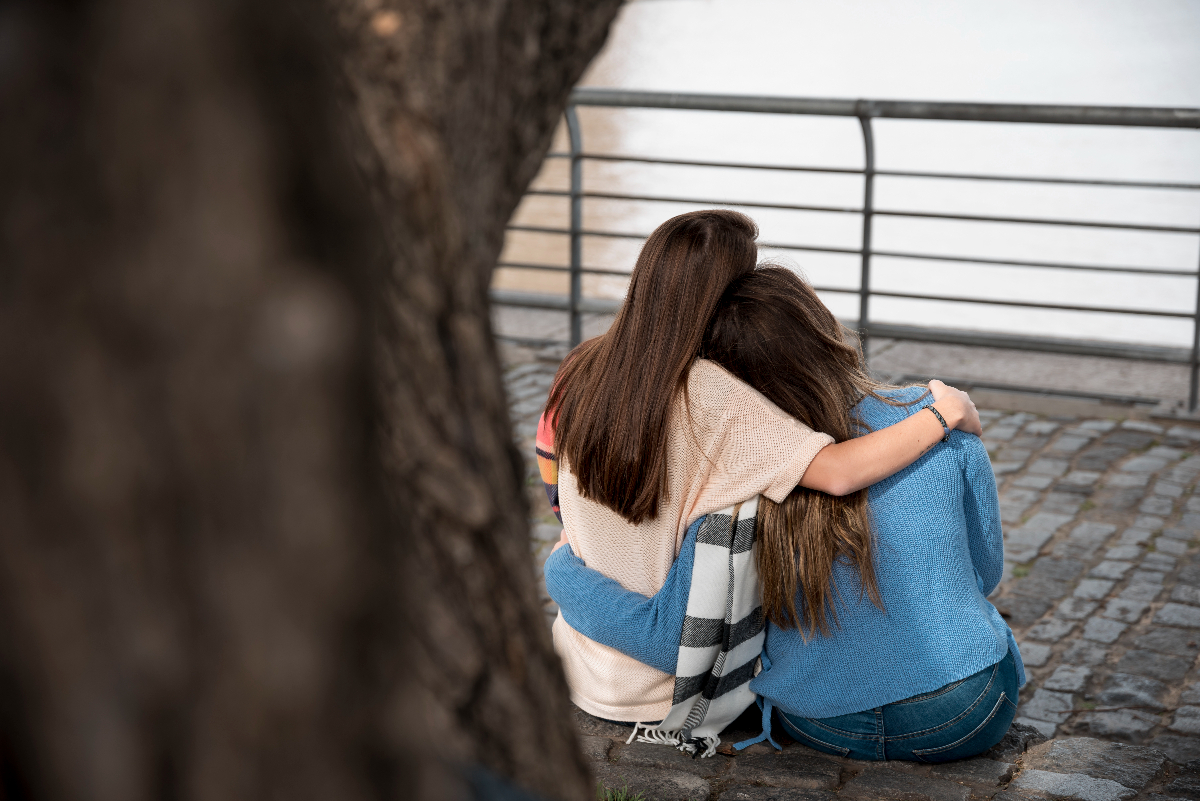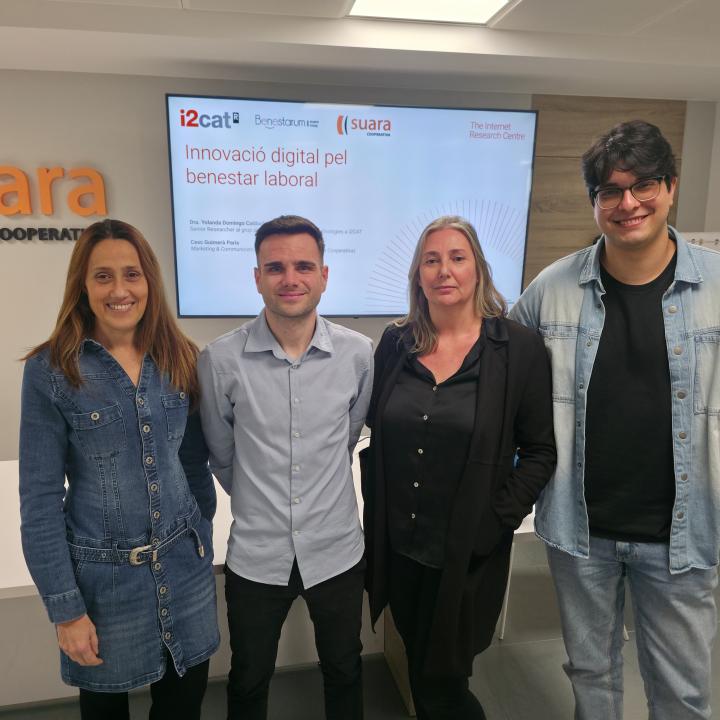One of the existing concerns in both the public administration and third sector entities is how to implement an LGTBI+ perspective in the services and resources of the General Directorate for Child and Adolescent Care (DGAIA), which belong to the Department of Social Rights.
Precisely, with this objective in mind, the guide "How to incorporate the LGBTI+ perspective in the services and resources of the General Directorate for Child and Adolescent Care" was born, promoted by the Secretariat for Childhood, Adolescence and Youth, as well as the Secretariat for Equality, through the General Directorate for LGBTI+ Public Policies of the Department of Equality and Feminisms.
Within the framework of this guide, Suara Cooperativa has been able to present two experiences that have taken place in the Assisted Apartment 16-18 Ebro Island and the Assisted Apartment 16-18 La Rapita, which we shared the day this document was presented, on October 4 at the delegation of the Generalitat de Catalunya in Tortosa.
As a result of our experience, we have been able to determine that when working with LGTBI+ realities in our services, there is no single answer and there is no single way of doing it. Each residential service (shelters, SPAAI, CRAE, assisted apartments) has its own idiosyncrasies; as well as its own internal culture at a general level, of the educational team and, obviously, of the users.
In this sense, it should be emphasized that a group of 16 to 18 year-old adolescents born in Catalonia is not the same as a group of 5-6 year-old children living together with pre-adolescents, or a group of young migrants. The way of working day to day with each of these groups will be different because the culture of each group (involving age, academic level, religious beliefs, social background, among others) that define them are different. Therefore, working from a gender perspective will undoubtedly be different as well.
If we could define in one word how we treat LGTBI+ diversity in our services, the answer would be NORMALITY. And the fact is that the sexuality of each individual should not be a differential, conditioning or excluding feature. Or at least, it should not be. This is precisely what we propose. Not to give importance to what should not have it.
Based on this premise, as an educational team, we consider that what we must do, what we are obliged to do, not as professionals, but as people, is not to prejudge, to know how to detect possible dangers and risk behaviors and above all, to LISTEN. Perhaps one of the worst evils of this society of ours is that, sometimes, we have the habit of not listening to ourselves very much.
From there, as professionals, we must be able to individualize our work in each specific case, since each LGTBI+ person lives their sexuality in a very different way from the rest. In our case, to make matters worse, we are talking about adolescents who are in the process of sexual discovery, which is sometimes difficult for them to understand and who come, in most cases, from conservative, unsuitable and repressive environments that have not accompanied them at any time in this process of discovery. One more stone added to the backpack they already carry with them because of the family history that surrounds them.
The following is the story of Anís and Nico and their point of view towards the LGTBI+ inclusion work that is done in the services managed by Suara Cooperativa.
Anís: the imposed exodus
"As a child I loved playing with my cousins' dolls. I would comb their hair, change their dresses and put make-up on them. Until my mother would come in with a sour-apple face. She would stretch out her arm in a bad way and pull me away from what I loved to do so much, but which, according to her, was dangerous for me. And I was afraid," says Anis, who is of Algerian origin.
From an early age, he realized that he didn't fit in there, as the boys and girls teased him because he looked like a girl. He never understood why his parents did not defend him. At the age of 12, his sexual desire for men was aroused and he understood that this was a problem in Algeria. His father even took him to a psychologist to see if he could cure him. "According to my father and all parents in Algeria, homosexuals do not exist in our country," says Anis, who adds that in this region it is a crime punishable by imprisonment.
Everything exploded the day she met a boy. His parents went camping and he said he was staying home because he wasn't feeling well. His mother didn't believe him, "When I was home alone, this gorgeous guy I had met came to be with me. We kissed and ended up in bed. And that's when my parents came back unexpectedly," he recalls.
After that, he was locked up at home for a week. His parents were in a dilemma as to whether or not to report him. Finally, the family decided that he should go to Europe and his father accompanied him to Barcelona where they slept for a week in a hostel. No one he knew wanted to take care of him and so his father gave him a hundred euros and told him to go to the police. "I used to be a believer. Now I'm not. A God doesn't do these things," emphasizes Anise.
From the police station he was taken to a center in Ametlla de Mar for young migrants. "I thought the worst was over and I could be really free, but suddenly I find myself surrounded by the same people and the same culture that threw me out of my country," explains Anís, who says he became repressed again. However, the social educators of the center perceived his sexual orientation and pulled the necessary strings so that he could go to an apartment in La Ràpita: "And there the sky opened up for me".
He is very grateful to the people he has met in this space: "I don't mind saying that the educators of Piso La Rapita are better than my family. That's how I feel. They are always looking after me. They ask me how I feel and if I need help, they know how to look for it. They listen to me. They listen to me a lot. I can explain everything that happens to me without holding back.

Nico: the butterfly
In a shattering account, Nico confesses that for many years his own life hurt his eyes and he hated it, so he had become accustomed to living among the darkness. "Like silkworms, that the first time you voice them you just get disgusted," expresses the young man. His mother died when he was little and his father never understood him.
"I've always been Nico. But before, he didn't call me that. Apparently, when I was born, someone decided that the name Anna was better for me. And for as long as I can remember, I remember that I was always dressed in girls' clothes," he says. They also gave him dolls, made him wear his hair long or laughed at him because he played with boys. But the worst was yet to come. "My body started to change. And my breasts swelled up like two balloons and my body was spitting blood. And I just wanted to die and go to my mother," he recalls.
He felt as if he had been put in a body he didn't belong in, which he decided to tell his father about. "He started to hate me. And he was always angry with me and didn't want in any way to let me be who I was," he stresses. As a result, he started to self-mutilate because he wanted to disappear. But one of these times it got out of hand and he had to go to the doctor. As a result, a protocol was activated, he found people who listened to him and, most importantly, understood him. "They explained to me that everyone has the right to be who they want to be and that no one has any right over anyone, in these things. Not even the parents," she explains. At that point, they offered to let his father leave, and he accepted. That's how he ended up in the Ebro Island Flat.
In that space, from the very first moment, he was treated like the boy he is. In addition, not only have they respected him, but he has also felt accompanied and loved by both the social educators and the rest of his companions. "Now we are facing my transition process. And we are also doing it together. They listen to me and advise me on the pros and cons. They don't put any pressure on me. I feel that whatever decision I make, they will give me unconditional support," says Nico, who concludes: "It will be a long time before we reconcile again, life and me. But I feel that little by little I am getting rid of the envelope that oppressed me, of whose cocoon I was a hostage. I feel that little by little, I stop being a silkworm to become a butterfly".
Marc Bolet Benito
Director of the Assisted Apartment 16-18 La Ràpita




